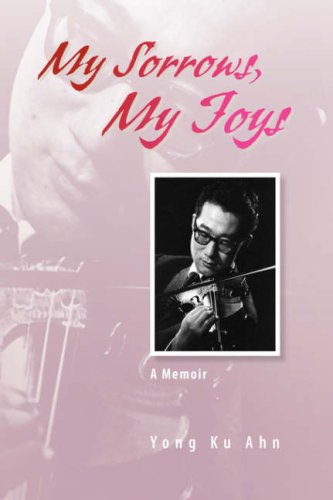AHN, YONG KU (1 risultati)
Tipo di articolo
- Tutti gli articoli
- Libri (1)
- Riviste e Giornali
- Fumetti
- Spartiti
- Arte, Stampe e Poster
- Fotografie
- Mappe
-
Manoscritti e
Collezionismo cartaceo
Condizioni
- Tutte
- Nuovi
- Antichi o usati
Legatura
- Tutte
- Rilegato
- Brossura
Ulteriori caratteristiche
- Prima edizione
- Copia autografata
- Sovraccoperta
- Con foto
- No print on demand
Paese del venditore
Valutazione venditore
-
My Sorrows, My Joys; A Memoir
Editore: Xlibris Corporation, Bloomington, IN, 2008
ISBN 10: 1436314887ISBN 13: 9781436314886
Da: Ground Zero Books, Ltd., Silver Spring, MD, U.S.A.
Libro Prima edizione Copia autografata
Hardcover. Condizione: Good. Condizione sovraccoperta: Very good. 193, [1] pages. Illustrations. Endnotes. Some weakness at the boards noted. Translated from the original Korean version If I were a Bird (Paju: Hangil Art, 2004) by Mi-won Kim Goldsmith. Inscribed by the author on the half-title page. Inscription reads To Dear Seenae With admiration for your talent and gratitude for your effort to make this book possible. March 30, 2008 Yong Ku. Born of wealthy parents, but shunned by his father, Yong Ku Ahn (1928-2013) suffered through a stormy and traumatic childhood, and in his loneliness, taught himself to play the violin. Born in 1928 in Wonsan, in what is today North Korea, Ahn's early childhood included parental rejection and a debilitating bout of polio that cut him off from his family and their social milieu. It was music and the violin in particular that saved him. After World War II, Ahn began his professional education. He studied in Germany, Austria, and London with some of the greatest violin teachers of the 20th century, fighting incredible obstacles all the time, but he never gave up. In later years, after teaching in the U.S., Yong Ku, who joined the faculty at the esteemed Peabody Conservatory of Music, not only become known internationally as a great teacher but went back to Korea to play an active role in the Korean reunification effort, making several trips to North Korea. His fascinating and inspiring story of triumph over tragedy set against a backdrop of Korea's liberation from Japanese rule and the Korean War is told with great feeling and humility and will inspire young people, especially young musicians, of all nationalities. From a review found on-line: Yong Ku Ahn, famed violinist and teacher of music, tells of both the sad moments and happy joys of his life in heart-rendering terms. After years of rejection by his parents, he reaches a peak experience one day, which finally leads him to pick up his dusty old violin and begin to play again in earnest. He describes marvelously one of those snowy days in Wonsan, Korea when he noticed an old gramophone at home, and "out of curiosity opened the lid to the box. There was a record placed in it. I turned the crank on the side of the box and carefully put the needle arm on the record . Four notes sounded: "Ta ta ta taaah." Then once again "Ta ta ta taaah ." The majestic and passionate notes of Beethoven's Fifth Symphony pierced his heart like a sharp spear, like fate knocking on the door. He writes, "The four notes repeated themselves like the persistent unhappiness of my childhood. When the symphony ended, uncontrollable tears flooded down my face. Over ten years of loneliness, injustice, disappointment and sorrow flowed from me as if a dam had burst open. It was a purely miraculous moment, never to be recreated in my life: the moment when I realized that there existed a world of breathlessly beautiful sound outside of my cold and miserable existence of constant alienation." Never has the power of serious Western music been better described. How many of us have encountered such an experience on first discovering the beauty of classical music. Ahn went on to become a great violinist, a pioneer in the introduction of music playing and appreciation in Korea. He describes his travels, his love of chamber music, his passionate involvement in the movement to unify Korea, north with south. At present, the names of his pupils are on marquees of concert halls all over the world. Now eighty-three years old, he ruminates on the passing away of time, philosophically accepting the loss of members of his "veteran music friends." He ends his memoirs with a heart-warming, yet sad, commentary on the human predicament. My Sorrows, My joys is a delightful book to read by anyone who has felt the cleansing power of great music, or the passion of dedication to a great enterprise swelling in his or her heart. Presumed First Edition, First printing thus.


